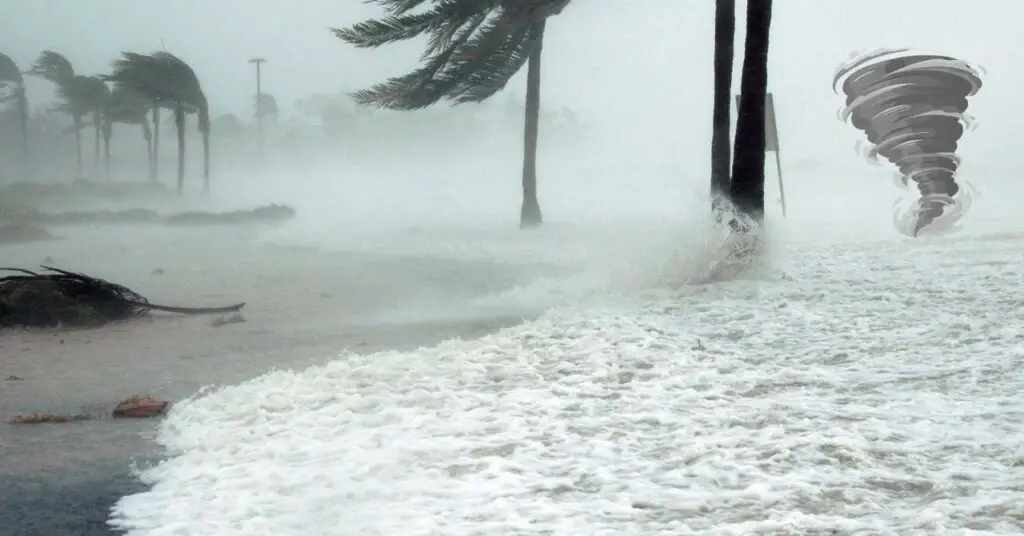Last updated on December 17th, 2022 at 02:03 pm
First of all, stay calm! Hurricanes in Florida are an annual event and familiar to all local residents. You see huge houses standing on the very coast, people live in them all year round, the buildings look great, palm trees grow on their roofs, their windows are not broken, although hurricanes happen in Miami every year.

According to statistics, super-powerful hurricanes of destructive power occur in Florida once every 11-12 years. The last such hurricane was Irma in 2017. Logically, until 2028-2029, there should be no major shocks in Miami. But you still shouldn’t rely on such statistics 100% – after all, this is just a history of observations. Due to climate change on our planet, the statistics of hurricanes can also change.
Therefore, we must warn you about the possible seriousness of the situation . It depends on three factors:
- The force of a hurricane . Regardless of which trajectory the hurricane is currently moving along (the trajectories of hurricanes are usually unstable, forecasts of their directions are constantly changing, and it is difficult to predict in which city the center of the hurricane, the so-called “eye”, will pass), it is prudent to make supplies of gasoline, water and non-perishable food for a week according to the instructions , if 7-8 days before the expected arrival of a hurricane in Florida, its strength is already estimated at 3 or 4 points on the Saffir-Simpson scale .
- The trajectory of the hurricane . If a hurricane of magnitude 3 or greater is heading directly towards your community, you should constantly monitor city officials for possible evacuations.
- The likelihood of flooding the area where you live . Find on the map (the map is active only during the approaching hurricane) your locality and home, make sure you live in the green or blue zone. Zoning of dangerous areas on this map is based on the possible exit from the shores of water bodies or the ocean. Due to strong winds, waves can flood certain areas, these are the so-called “storm surges”.
Hurricanes, their strength and estimated paths are best viewed at Cyclocane.com .
Every hurricane we happen to interact with teaches us lessons for the future. I would like to believe, of course, that the experience of experienced hurricanes will remain in the past and we will never need it again, but, unfortunately, this is not happening yet …
From our personal experience, we want to describe some of the key actions to take if you know that a hurricane encounter is imminent.
Check if you have enough drinking water
Check if you have enough drinking water. The recommended rate is one gallon per person per day, including pets. If you understand that you need to buy more water, but it is no longer available in stores near you, try ordering on Amazon, or go to stores in near you.
Also stock up on plain tap water. Cold water is rarely turned off during hurricanes, but if a fallen tree damages a water pipe, or, for example, a water tower is without electricity, then there may be no water for several days.
Fill up a full tank of the car
Fill up a full tank of your car as soon as you realize that queues of 10 cars or more have started to form at gas stations. Gas stations will be closed 2-3 days before the arrival of a hurricane in your city and will open only a day or two after it leaves.
It makes sense to buy and fill the canister, but you need to have a good idea where you will store it – the canister cannot be kept in the heat and in the living room. Condominium associations also ban jerry cans from parking spaces. In hot Miami, unfortunately, you can’t keep a canister of gasoline in the trunk either – gasoline vapors will quickly fill the entire car.
Make sure the car is safe
If your condominium or private home does not have a covered parking or garage, book a parking space in any covered parking near you.
It is worth making sure that the car is not threatened by flooding, flying branches and debris, there are no poles and trees that can fall on it, and there are no things left in the car that could attract intruders.
Remove everything from balconies and terraces
Remove all furniture, barbecue and plants from the balcony. It is necessary! A powerful hurricane can blow away even a heavy sofa and grill, which can create huge problems for neighbors by breaking windows and injuring someone.
Be sure to see if your neighbors have cleaned everything. This is both their safety and yours. If there are any items left, please notify the management company. There are a lot of seasonally used housing in Florida, so there may simply not be neighbors in the city.
Prepare for a power outage
For the duration of a strong hurricane (3 points and above), electricity is usually cut off throughout the city for several hours. If a hurricane damages the wires, then there may be no electricity for several days.
Sometimes condominiums and private homes have diesel-powered power generators. If the house where you live has such a generator, then you will be provided with basic electricity even during the passage of a powerful hurricane. But if there is no generator, then it makes sense to buy at Amazon at least solar batteries for charging phones and a Jump Start portable battery .
You will not be left without food, almost all supermarkets have their own power generators, but without hot water in a heat of 35 ° C it will be difficult, because there is practically no main hot water anywhere in Miami – only boilers inside each apartment, townhouse or private house. However, there is a wonderful way out – the water is perfectly heated in a natural way in the sun. You only need to purchase containers that have good thermal conductivity (for example, aluminum or steel buckets ), although water will also quickly heat up in a black or blue plastic canister .
Ensure windows and doors are secure
Throughout the coast of Florida, “hurricane-proof” building standards apply: walls made of durable materials; entrance doors to entrances and halls, always opening from the room to the street with a “push” mechanism; only sliding, not hinged, windows and balcony doors, glazed not with ordinary glass, but with much stronger and thicker plexiglass, which is called “Hurricane Proof”. However, if you are in doubt that your condominium, townhouse or private home has such protection, then you should order the installation of temporary plywood or metal shields on windows and doors. This is especially critical if you plan to move out and leave the house unattended.
Be sure to check that all the rollers are in place at the balcony doors and that they do not shake with little effort. Check that all windows are tightly closed.
If any doors can be flooded, they should be laid with special sandbags .
stock up on groceries
Stock up on foods that will not go bad: bananas, snacks, breakfast cereals, nuts, canned food, shelf-stable milk .
Insure property
Think about what kind of property it makes sense to insure – a house, a car, a yacht … Keep in mind that you can also insure what you rent, and some companies offer short-term insurance. If insurance is already in place, many expand coverage immediately upon receipt of a hurricane warning and return the previous conditions after it passes.
Ensure your own safety during and after a hurricane
During a hurricane
- Move all beds away from windows and keep window shades or blinds down.
- Do not open windows, balconies and doors under any circumstances, even if it seems to you that the hurricane has subsided. Quite possibly, this is only the “eye” of the hurricane. During its passage, both rain and wind can subside, but a new, even stronger, squall of wind with a downpour can strike at any moment.
- In some sources, you may find advice to open windows and doors to “pressure out” a hurricane. Under no circumstances should this be done!
- Do not use any type of open flame in your home, not even candles, as a gust of wind could blow open a window or door and start a fire. Also, you can not light a fire outside the house.
- If you have a garage in your house, avoid the temptation to use the car as a generator – you can easily get poisoned by exhaust fumes, even death.
After the hurricane
- Do not leave the house until you are absolutely sure that the hurricane has passed!
- Beware of broken wires and fallen power poles.
- Avoid puddles both on foot and by car. They can contain any debris, including glass and nails, as well as broken live wires.
- Flooding can bring any kind of wildlife to your home, especially reptiles. Before jumping into the pool for joy, check that there is no snake or even a crocodile in it.
Stock up on cash
Due to problems with electricity, communication may not work, and, as a result, cashless payment terminals in stores may not work. Also, banks and ATMs may not work for a long time. It is desirable to have cash in small denominations.
Collect first aid kit
In addition to a first aid kit with supplies that can come in handy in case of injuries (unfortunately, there are also cuts and bruises), make sure you have enough medicines prepared that your family uses regularly. If some medicines should be stored in the refrigerator, take care of refrigerants.
We will track for you the emergence of new hurricanes in the Atlantic and the Gulf of Mexico and publish relevant links in this article to those hurricanes that are moving towards the state of Florida. Visit our website often to receive this important information in Russian. The most up-to-date information in English can be found at this link .
Read also: Flooding on South Africa washed away roads, destroyed homes, Over 300 killed
![[2023]Downloading YouTube Videos on iPhone The Ultimate Guide to Downloading YouTube Videos on iPhone The Ultimate Guide to](https://teachtactic.com/wp-content/uploads/2023/08/Downloading-YouTube-Videos-on-iPhone-The-Ultimate-Guide-to-150x150.jpg)





![[2023]Downloading YouTube Videos on iPhone The Ultimate Guide to 2 Downloading YouTube Videos on iPhone The Ultimate Guide to](https://teachtactic.com/wp-content/uploads/2023/08/Downloading-YouTube-Videos-on-iPhone-The-Ultimate-Guide-to.jpg)



Great tips and thanks for sharing